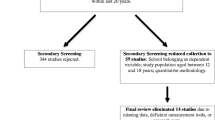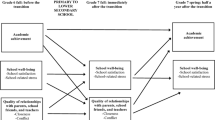Abstract
A significant gap remains in our understanding of the conditions under which parents’ racial socialization has consequences for adolescents’ functioning. The present study used longitudinal data to examine whether the frequency of communication between African American parents and adolescents (N = 504; 49 % female) moderates the association between parent reports of racial socialization (i.e., cultural socialization and preparation for bias) at 8th grade and adolescent reports of racial identity (perceived structural discrimination, negative public regard, success-oriented centrality) at 11th grade, and in turn, academic attitudes and perceptions. Parents’ racial socialization practices were significant predictors of multiple aspects of adolescents’ racial identity in families with high levels of communication, but they did not predict any aspects of adolescents’ racial identity in families with low levels of communication. Results highlight the importance of including family processes when examining the relations between parents’ racial socialization and adolescents’ racial identity and academic attitudes and perceptions.


Similar content being viewed by others
References
Allison, P. D. (2003). Missing data techniques for structural equation modeling. Journal of Abnormal Psychology, 112, 545–557. doi:10.1037/0021-843X.112.4.545.
Ceballo, R., Kennedy, T., Bregman, A., & Epstein-Ngo, Q. (2012). Always aware (Siempre Pendiente): Latina mothers’ parenting in high-risk neighborhoods. Journal of Family Psychology, 26, 805–815. doi:10.1037/a0029584.
Chavous, T. M., Bernat, D. H., Schmeelk-Cone, K., Caldwell, C. H., Kohn-Wood, L., & Zimmerman, M. A. (2003). Racial identity and academic attainment among African American adolescents. Child Development, 74(4), 1076–1090. doi:10.1111/1467-8624.00593.
Coard, S. I., & Sellers, R. M. (2005). African American families as a context for racial socialization. In V. McLoyd, N. Hill, & K. Dodge (Eds.), Emerging issues in African-American family life: Context, adaptation & policy. New York: Guilford Press.
Cooper, S., & McLoyd, V. C. (2011). Racial barrier socialization and the well-being of African American adolescents: The moderating role of mother-adolescent relationship quality. Journal of Research on Adolescence, 21, 895–903. doi:10.1111/j.1532-7795.2011.00749.x.
Cross, W. E, Jr. (1971). The Negro-to-Black conversion experience. Black World, 20(9), 13–27.
Darling, N., & Steinberg, L. (1993). Parenting style as context: An integrative model. Psychological Bulletin, 113, 487–496. doi:10.1037/0033-2909.113.3.487.
Demo, D. H., & Hughes, M. (1990). Socialization and racial identity among Black Americans. Social Psychology Quarterly, 53(4), 364–374. doi:10.2307/2786741.
Eccles, J. S. (1997). MADICS study of adolescent development in multiple contexts, 1991–1998. Cambridge, MA: Murray Research Archive. http://hdl.handle.net/1902.1/01066. Research Archive [Distributor] V2
Eccles, J. S., Midgley, C., Wigfield, A., Buchanan, C. M., Reuman, D., Flanagan, C., & Mac Iver, D. (1993). Development during adolescence: The impact of stage-environment fit on young adolescents’ experiences in schools and in families. American Psychologist, 48(2), 90–101.
Ennett, S., Bauman, K., Foshee, V., Pemberton, M., & Hicks, K. (2001). Parent–child communication about adolescent tobacco and alcohol use: What do parents say and does it affect youth behavior? Journal of Marriage and Family, 63, 48–62. doi:10.1111/j.1741-3737.2001.00048.x.
Erikson, E. H. (1994). Identity: Youth and crisis (Vol. 7). New York: WW Norton & Company.
Fisher, C. B., Wallace, S. A., & Fenton, R. E. (2000). Discrimination distress during adolescence. Journal of Youth and Adolescence, 29(6), 679–695. doi:10.1023/A:1026455906512.
Frabutt, J. M., Walker, A. M., & MacKinnon-Lewis, C. (2002). Racial socialization messages and the quality of mother/child interactions in African American families. Journal of Early Adolescence, 22(2), 200–217. doi:10.1177/0272431602022002004.
French, S. E., Seidman, E., Allen, L., & Aber, J. L. (2000). Racial/ethnic identity, congruence with the social context, and the transition to high school. Journal of Adolescent Research, 15(5), 587–602. doi:10.1177/0743558400155004.
Hu, I. T., & Bentler, P. (1999). Cutoff criteria for fit indices in covariance structure analysis: Conventional criteria versus new alternatives. Structural Equation Modeling: A Multidisciplinary Journal, 6, 1–55. doi:10.1080/10705519909540118.
Hughes, D. (2003). Correlates of African American and Latino parents’ messages to children about ethnicity and race: A comparative study of racial socialization. American Journal of Community Psychology, 31(1/2), 15–33.
Hughes, D., & Chen, L. (1997). When and what parents tell children about race: An examination of race-related socialization among African American families. Applied Developmental Science, 1(4), 200–214. doi:10.1207/s1532480xads0104_4.
Hughes, D., Hagelskamp, C., Way, N., & Foust, M. (2009). The role of mothers’ and adolescents’ perceptions of ethnic-racial socialization in shaping ethnic–racial identity among early adolescent boys and girls. Journal of Youth and Adolescence, 38, 605–626. doi:10.1007/s10964-009-9399-7.
Hughes, D., & Johnson, D. (2001). Correlates in children’s experiences of parents’ racial socialization behaviors. Journal of Marriage and Family, 63(4), 981–995. doi:10.1111/j.1741-3737.2001.00981.x.
Hughes, D., Rivas, D., Foust, M., Hagelskamp, C., Gersick, S., & Way, N. (2008). How to catch a moonbeam: A mixed-methods approach to understanding ethnic socialization processes in ethnically diverse families. In S. M. Quintana & C. McKown (Eds.), Handbook of race, racism, and the developing child (pp. 226–277). doi:10.1002/9781118269930
Hughes, D., Rodriguez, J., Smith, E., Johnson, D., Stevenson, H., & Spicer, P. (2006). Parents’ ethnic-racial socialization practices: A review of research and direction for future study. Developmental Psychology, 42, 747–770. doi:10.1037/0012-1649.42.5.747.
Kerr, M., & Stattin, H. (2000). What parents know, how they know it, and several forms of adolescent adjustment: Further support for a reinterpretation of monitoring. Developmental Psychology, 36(3), 366–380. doi:10.1037//0012-1649.36.3.366.
Laursen, B., & Collins, W. A. (2013). Parent–child communication during adolescence. In A. Vangelisti (Ed.), The Routledge handbook of family communication (2nd ed., pp. 333–348). New York: Routledge.
Marshall, S. (1995). Ethnic socialization of African American children: Implications for parenting, identity development, and academic achievement. Journal of Youth and Adolescence, 24, 377–396. doi:10.1007/BF01537187.
McHale, S. M., Crouter, A. C., Kim, J. Y., Burton, L. M., Davis, K. D., Dotterer, A. M., & Swanson, D. P. (2006). Mothers’ and fathers’ racial socialization in African American families: Implications for youth. Child Development, 77(5), 1387–1402. doi:10.1111/j.1467-8624.2006.00942.x.
Moschis, G. (1985). The role of family communication in consumer socialization of children and adolescents. Journal of Consumer Research, 11(4), 898–913.
Muthén, L. K., & Muthén, B. O. (1998–2010). Mplus user’s guide (6th ed.). Los Angeles, CA: Muthén Press.
Neblett, E., Smalls, C., Ford, K., Nguyen, H., & Sellers, R. (2009). Racial socialization and racial identity: African American parents’ messages about race as precursors to identity. Journal of Youth and Adolescence, 38, 189–203. doi:10.1007/s10964-008-9359-7.
Oyserman, D., Harrison, K., & Bybee, D. (2001). Can racial identity be promotive of academic efficacy? International Journal of Behavioral Development, 25(4), 379–385. doi:10.1080/01650250042000401.
Oyserman, D., Kemmelmeier, M., Fryberg, S., Brosh, H., & Hart-Johnson, T. (2003). Racial-ethnic self-schemas. Social Psychology Quarterly,. doi:10.2307/1519833.
Phinney, J. S. (1989). Stages of ethnic identity development in minority group adolescents. Journal of Early Adolescence, 9(1–2), 34–49. doi:10.1177/0272431689091004.
Phinney, J. S., & Chavira, V. (1995). Parental ethnic socialization and adolescent coping with problems related to ethnicity. Journal of Research on Adolescence, 5, 31–54. doi:10.1207/s15327795jra0501_2.
Resnicow, K., Soler, R. E., Braithwaite, R. L., Selassie, M. B., & Smith, M. (1999). Development of a racial and ethnic identity scale for African American adolescents: The Survey of Black Life. Journal of Black Psychology, 25(2), 171–188. doi:10.1177/0095798499025002003.
Rivas-Drake, D. (2011). Ethnic-racial socialization and adjustment among Latino college students: The mediating roles of ethnic centrality, public regard, and perceived barriers to opportunity. Journal of Youth and Adolescence, 40, 606–619. doi:10.1007/s10964-010-9564-z.
Rivas-Drake, D., Hughes, D., & Way, N. (2009). A preliminary analysis of associations among ethnic-racial socialization, ethnic discrimination, and ethnic identity among diverse urban sixth graders. Journal of Research on Adolescence, 19(3), 558–584. doi:10.1111/j.1532-7795.2009.00607.x.
Romero, A. J., & Roberts, R. E. (1998). Perception of discrimination and ethnocultural variables in a diverse group of adolescents. Journal of Adolescence, 21(6), 641–656. doi:10.1006/jado.1998.0185.
Seaton, E. K., Yip, T., & Sellers, R. M. (2009). A longitudinal examination of racial identity and racial discrimination among African American adolescents. Child Development, 80(2), 406–417. doi:10.1111/j.1467-8624.2009.01268.x.
Sellers, R. M., Copeland-Linder, N., Martin, P. P., & Lewis, R. L. (2006). Racial identity matters: The relationship between racial discrimination and psychological functioning in African American adolescents. Journal of Research on Adolescents, 16(2), 187–216. doi:10.1111/j.1532-7795.2006.00128.x.
Sellers, R. M., Rowley, S. A. J., Chavous, T. M., Shelton, J. N., & Smith, M. A. (1997). Multidimensional Inventory of Black Identity: A preliminary investigation of reliability and construct validity. Journal of Personality and Social Psychology, 73(4), 805–815. doi:10.1037/0022-3514.73.4.805.
Sellers, R., Smith, M., Shelton, J. N., Rowley, S., & Chavos, T. (1998). Multidimensional model of racial identity: A reconceptualization of African American racial identity. Personality and Social Psychology Review, 2, 18–39. doi:10.1207/s15327957pspr0201_2.
Smalls, C. (2009). African American adolescent engagement in the classroom and beyond: The roles of mother’s racial socialization and democratic-involved parenting. Journal of Youth and Adolescence, 38(2), 204–213. doi:10.1007/s10964-008-9316-5.
Smith, E. P., Atkins, J., & Connell, C. M. (2003). Family, school, and community factors and relationships to racial–ethnic attitudes and academic achievement. American Journal of Community Psychology, 32(1–2), 159–173. doi:10.1023/A:1025663311100.
Stevenson, H. C. (1994). Validation of the Scale of Racial Socialization for African American adolescents: Steps toward multidimensionality. Journal of Black Psychology, 20(4), 445–468. doi:10.1177/00957984940204005.
Stevenson, H. (1995). Relation of adolescent perceptions of racial socialization to racial identity. Journal of Black Psychology, 21, 49–70. doi:10.1177/00957984950211005.
Stevenson, H. C. (1997). Managing anger: Protective, proactive, or adaptive racial socialization identity profiles and African-American manhood development. Journal of Prevention and Intervention in the Community, 16, 35–61.
Tatum, B. D. (1997). “Why are all the Black kids sitting together in the cafeteria?” And other conversations about race. New York: Basic Books.
Taylor, A., & Graham, S. (2007). An examination of the relationship between achievement values and perceptions of barriers among low-SES African American and Latino students. Journal of Educational Psychology, 99, 52–64. doi:10.1037/0022-0663.99.1.52.
Thomas, A. J., & King, C. T. (2007). Gendered racial socialization of African American mothers and daughters. The Family Journal, 15(2), 137–142. doi:10.1177/1066480706297853.
Williams, J. L., & Smalls-Glover, C. (2014). Content and attributions of caregiver racial socialization as predictors of African American adolescents’ private racial regard. Journal of Black Psychology, 40, 69–80. doi:10.1177/0095798412471681.
Wills, T. A., Murry, V. M., Brody, G. H., Gibbons, F. X., Gerrard, M., Walker, C., & Ainette, M. G. (2007). Ethnic pride and self-control related to protective and risk factors: Test of the theoretical model for the strong African American families program. Health Psychology, 26, 50–59. doi:10.1037/0278-6133.26.1.50.
Acknowledgments
Support for this article was provided in part by Award Number T32HD007109 from the Eunice Kennedy Shriver National Institute of Child Health & Human Development awarded to the first author.
Authors’ Contributions
ST conceived of the study, participated in designing the study, performed the statistical analyses, and participated in the write up of the manuscript. VCM conceived of the study, and assisted in designing the study and writing the manuscript. SKH conceived of the study, and participated in designing the study and writing the manuscript. All authors read and approved the final version of this manuscript.
Author information
Authors and Affiliations
Corresponding author
Ethics declarations
Conflicts of interest
The authors report no conflicts of interest.
Rights and permissions
About this article
Cite this article
Tang, S., McLoyd, V.C. & Hallman, S.K. Racial Socialization, Racial Identity, and Academic Attitudes Among African American Adolescents: Examining the Moderating Influence of Parent–Adolescent Communication. J Youth Adolescence 45, 1141–1155 (2016). https://doi.org/10.1007/s10964-015-0351-8
Received:
Accepted:
Published:
Issue Date:
DOI: https://doi.org/10.1007/s10964-015-0351-8




